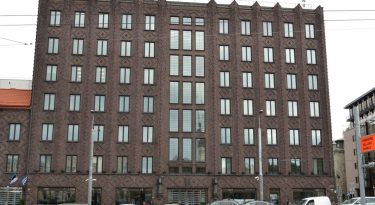CASE STUDIES
TROPICO conducts case studies on various dynamics and aspects of the digital transformation of public administrations in Europe over its project duration. This online case study repository gives access to all our empirical research in a condensed format. Please contact [email protected] or the case study author for further information.
RKG Agder: Leadership involvement and ICT-enabled structure for collaboration within eHealth in Norway
Ensuring innovative collaboration and working in an effective, environmentally-friendly way, is one of the main objectives of the RKG, and information and communication technology (ICT) has played a very important role in ensuring successful collaboration. Since its establishment in 2016, most of its meetings have been organised digitally. The digital working practices enabled functioning of RKG’s structure, centred around involvement of the leadership-level representatives of Agder’s regions (municipalities). Heads of Municipal Affairs representing…
Read MoreThe first full-scale project with telemedicine in Denmark
TelCare Nord was initiated in January 2012 by the Region of Northern Jutland in Denmark. The collaboration focused on telemedicine for patients suffering from Chronic Obstructive Pulmonary Disease (COPD). The project ran to June 2015 and was the first full scale project with telemedicine in Denmark (TeleCare Nord, 2015). The collaboration involved an executive project secretariat, a steering group, a business committee and four working groups, and included the Region of Northern Jutland,…
Read MoreWaste management in the City of Tallinn – improving quality through increased local government role

Waste management in Tallinn is organised through a collaboration between several public and private sector organisations. The central role is held by the Tallinn Waste Centre who coordinate day-to-day activities as the representative of the city of Tallinn through activities including mediating the negotiation and management of contracts between the clients and the waste collectors, determining the best routes within the managed city districts, processing complaints, and conducting supervision activities. The data exchange facilitated…
Read MoreGovernment Cloud services for First Aid exams, Hungary
The procedure for obtaining a driver’s licence in Hungary involves multiple interactions with both governmental and non-governmental agencies. In the light of the country’s e-governance strategy, the collaborations around the creation of driving licences have been reformed with legislation that came into force on 1st of February 2021. The objective is to reduce the burden of bureaucracy for citizens, to provide prompt transfer of data between the relevant agencies, and to provide a higher…
Read MoreHungary: a systematic collaboration of volunteer and professional fire units

Although Hungary, as a country with a centralized public administration maintains national professional fire services, recent policy changes brought a large increase in the number of volunteer fire brigades, and an enhancement of their competences. The National Directorate General for Disaster Management (NDGDM) introduced the new status of ‘Responding Volunteer Fire Brigades’ (RFVB) for volunteer groups that could satisfy the strict eligibility criteria. By the end of 2020, 58 volunteer brigades had…
Read MoreNeteland: five Flemish municipalities take collaboration to the next level
Neteland is a collaborative service delivery arrangement between five Flemish municipalities. Collaboration is viewed as a key mechanism to increase the efficiency of public service delivery in the region and to groom the involved municipalities to better tackle potential future challenges local governments will have to deal with. In accordance with the Neteland police district, the Neteland municipal region was used in 2016 as a starting point for intensive municipal collaboration. The collaboration currently…
Read MoreShared services - “less administrative burden, lower costs, more legal certainty” – an award-winning joint procurement centre in the German district of Groß-Gerau
Against the backdrop of burgeoning public deficits and pressing infrastructure challenges typical of a rapidly growing population, in 2013, the district of Groß-Gerau in the German federal state of Hesse, adopted inter-municipal collaboration (IMC) as a key approach for sustainability and prosperity of its 14 member cities and municipalities. Since then, it has successively expanded its collaboration portfolio. This process has also put forth an award-winning joint procurement centre that has centralised procurement for…
Read MoreThe guichet SUD THD: an e-counter linking local authorities and private operators for the deployment of optical fibre in the South of France
The development of electronic solutions for many aspects of daily life has turned the deployment of optical fibre into a crucial matter, including in remote, mountainous and lightly populated territories such as the Région Sud in France. These characteristics make the deployment of optical fibre difficult and economically unprofitable. To address this issue, local authorities set up a collaborative arrangement - SUD THD - a syndicate that aimed at coordinating investments in electronic and…
Read MoreThe Effects of Collaboration for Government Efficiency in Belgium – The Case of PoWalCo
The PoWalCo (Plateform wallonne de coordination des chantiers) online platform is a digital tool that aims at facilitating collaborations among actors such as utility companies and public authorities who work on roads and waterways in the Walloon Region in Belgium. Through the online platform, actors can exchange information about the planning, coordination, and authorization of the worksites on the Walloon roads and waterways. In this way, repeated public works on the same stretch of…
Read Moreminsak.no: An online petition platform for all Norwegian municipalities and regions

“minsak.no”, founded in January 2013, is an online petition tool that can be used for the submission of petitions at the regional and municipal level within the framework of §39a of the Norwegian Municipal Act. Paragraph 39a guarantees the citizens of Norway that local and regional legislative bodies have to deal with the petitioners’ proposal if at least two per cent of the population signed a petition. If the municipality has 15,000 residents or more,…
Read More